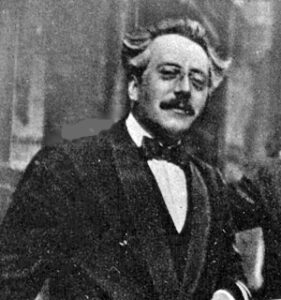Bridge, Music, When Soft Voices Die
 Frank Bridge (1879-1941) tends to be overshadowed in the historical flow of early 20th-century British music by his contemporaries Gustav Holst and Ralph Vaughan Williams. Like Holst and Vaughan Williams, he studied with Charles Villiers Stanford. And as teacher to Benjamin Britten, Bridge provides an important link to the generation of British composers that followed.
Frank Bridge (1879-1941) tends to be overshadowed in the historical flow of early 20th-century British music by his contemporaries Gustav Holst and Ralph Vaughan Williams. Like Holst and Vaughan Williams, he studied with Charles Villiers Stanford. And as teacher to Benjamin Britten, Bridge provides an important link to the generation of British composers that followed.
He was raised in a musical family and learned a variety of musical skills from his father who was a bandleader at a theater in Brighton. He excelled as a violinist and violist and earned a scholarship to study at the Royal College of Music with Stanford. Very early in his career, when famed violinist Johann Joachim brought his string quartet to London, the violist fell ill and Bridge was brought in on short notice to substitute for him. He also performed on the U.K. premiere of Debussy’s string quartet.
His compositional style matured after World War I, but his more youthful pre-war works tend to receive the most attention. His early works include quite a few songs and short chamber works that met the demand of accomplished amateurs performing in their homes. This work is from a set of three songs composed in 1907 for voice, piano, and viola. The texts of the songs come from three different poets, this one from Percy Bysshe Shelley:
Music, when soft voices die,
Vibrates in the memory;
Odours, when sweet violets sicken,
Live within the sense they quicken.Rose leaves, when the rose is dead,
Are heaped for the belovèd’s bed;
And so [thy]1 thoughts, when thou art gone,
Love itself shall slumber on.



